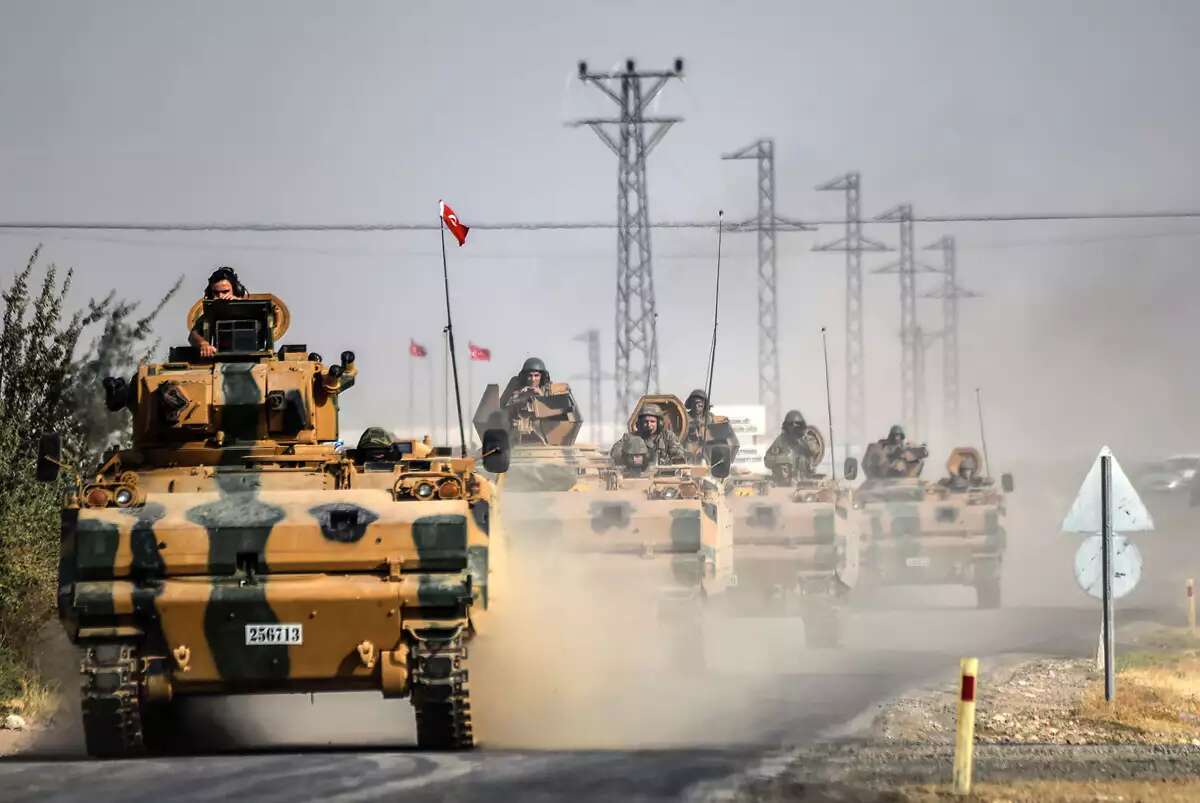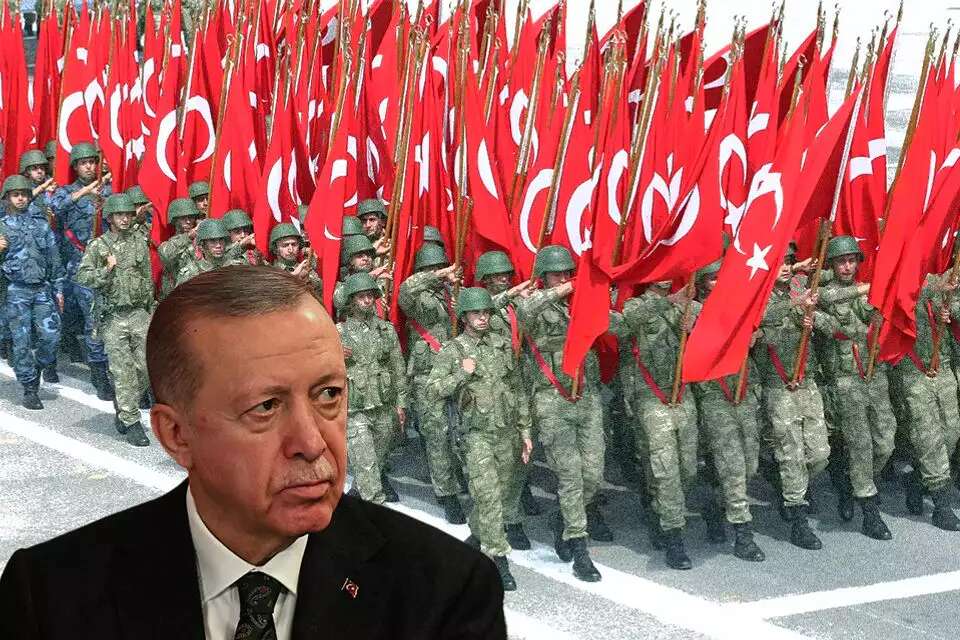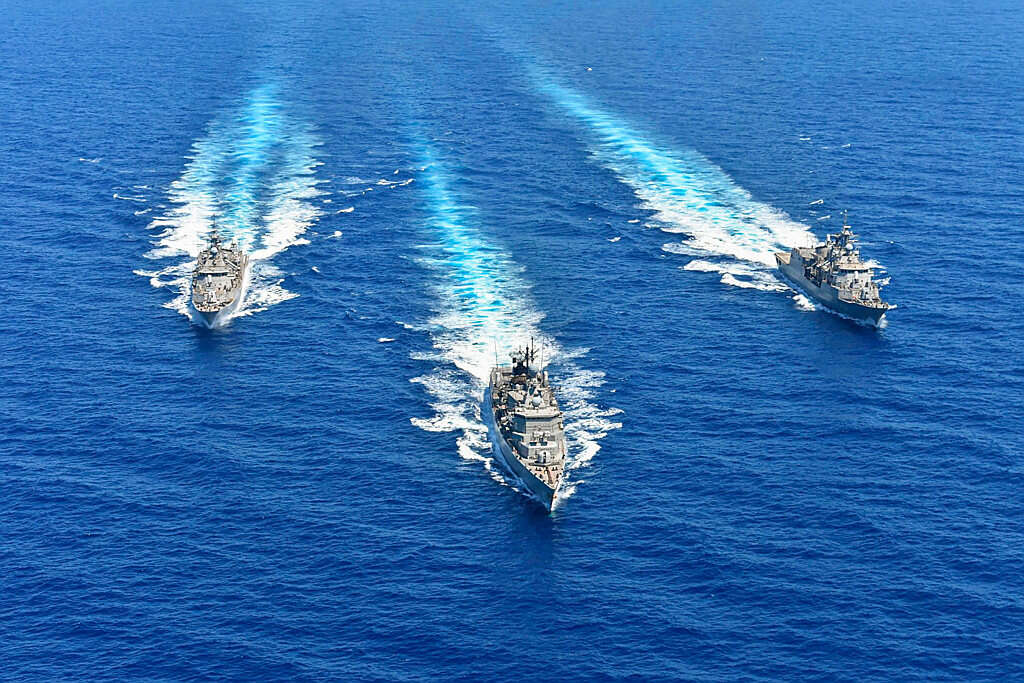The Kurdish residents of Kobani, a city in northeastern Syria, have endured numerous hardships. They suffered brutal oppression under the Assad regime and heroically withstood a prolonged siege by the terrorist group ISIS, which left devastating destruction and death in the once-peaceful border town.
But now, they are looking north with trepidation. Just meters away from the city's center, across the border, looms a threat that even the Kurdish militia fighters fear they cannot withstand: Erdogan's Turkish war machine.
"We have endured so much suffering," said Sara Haso, a resident of Kobani, in an interview with an American radio station. Standing before a statue commemorating female fighters who stood against ISIS, she added, "We were driven from our homes by ISIS, faced a long exile, and now we fear we'll be forced to leave again."
For the Kurds of Kobani and the broader Kurdish autonomy in northeastern Syria, known as Rojava, there is every reason to fear a Turkish invasion. Just last week, Erdogan threatened to "eradicate" the Syrian Democratic Forces (SDF), the umbrella organization of militias defending the Kurdish autonomy. While the Kurds have managed to partially fend off Turkish-backed rebel groups, facing Turkey's military directly presents an entirely different challenge.

Unprecedented military buildup
Erdogan's foreign policy ambitions extend far beyond Syria and Rojava. Turkey has established numerous military fronts, where verbal threats could rapidly transform into military engagements aimed at asserting Ankara's dominance in the region and beyond. For instance, Turkey has launched airstrikes against bases of the Kurdish PKK organization in Iraq and maintains military bases deep within Iraqi territory.
Unlike Western European NATO allies, whose militaries underwent significant reductions after the collapse of the Soviet Union, Turkey's military has grown stronger. It boasts 700 modern main battle tanks, more than the combined forces of Germany and France, and an additional 1,500 older tanks that have been partially or fully upgraded over the past two decades. More significantly, last year Turkey began mass production of its domestically produced Altay heavy battle tanks.
Since the 2016 coup attempt, Erdogan and his ruling Justice and Development Party (AKP) have solidified their control over the military, removing officers aligned with the secular Kemalist ideology and replacing them with loyalists. Simultaneously, Erdogan has expanded and upgraded Turkey's ground forces to support his ambitions of making Turkey a regional superpower.

Cyprus, Greece, and beyond
The Syrian and Iraqi borders are far from the only areas where Erdogan seeks to establish Turkish power. Cyprus remains divided between an independent Greek-speaking state, a member of the European Union, and a puppet Turkish speaking republic controlled by Ankara. Meanwhile, Greece, a strong NATO ally, faces increasing threats from Turkey.
This month, Turkey plans to conduct the "Mavi Vatan" ("Blue Homeland") exercise in the Aegean Sea, involving dozens of naval vessels. The drill signals Erdogan's aspirations to transform the eastern Mediterranean into a "Turkish sea."
To achieve dominance in the eastern Mediterranean, including its vast gas fields, Turkey is building an unprecedented naval force not seen since the Ottoman Empire. Last year, the Turkish navy launched the Anadolu, an amphibious assault ship and drone carrier converted from a Spanish design, serving as a "long arm" for Turkey's powerful drone fleet. Less than a week ago, Ankara announced the procurement of three new vessels: an advanced locally made submarine, a destroyer equipped with anti-aircraft missiles (drawing lessons from Russia's war in Ukraine), and most notably, Turkey's first aircraft carrier, a massive ship named "Mugham."
This growing naval capability will soon allow Turkey to conduct air support operations far from its shores, bolstering its expanding presence in regions such as the Horn of Africa, Qatar, and Libya.
Behind Turkey's air, sea, and land buildup lies its burgeoning defense industry. Erdogan's decision to anchor his military ambitions in domestic production rests on an increasingly capable and continually improving Turkish defense sector, comprising a diverse array of private and state-owned companies.
Over the past three decades, Turkey's industrial sector has undergone phenomenal growth, attracting experts, engineers, and industrial know-how that now drive its defense industry. Baykar, a private company, has become globally renowned for its drones, including the ambitious Bayraktar Kizilelma, a multi-purpose UAV that serves as the first-of-its-kind unmanned combat aircraft. Additionally, Turkish Aerospace Industries, a government-owned firm, recently conducted its first test flight of the Kaan, a manned stealth fighter designed to replace Turkey's fleet of American F-16s.

A revolution in arms production
Turkey's transformation in defense production is nothing short of a modern marvel. "Over the past two decades, Turkey has undergone significant military strengthening and established an independent defense industry," explained Dr. Assa Ophir, an expert on Turkey from Ariel University's Department of Middle Eastern Studies and Political Science.
"In the early 2000s, Turkey was one of the world's largest arms importers, unable to produce almost anything domestically. By the late 1990s, the Turkish government made a strategic decision to develop a defense industry to meet its military needs and reduce its dependence on foreign powers. The guiding principle was to increase domestic production, incentivize investment and exports, and welcome foreign partners," said Ophir, who predicts a bright future for Turkey's arms industry.
"Within two decades, Turkey has transformed from a country with virtually no defense industry to a prominent arms exporter, producing both naval and ground systems and selling them around the globe. Today, four Turkish companies rank among the top 100 global defense firms. They have made tremendous progress in a relatively short time. There are over 2,000 Turkish defense companies driving projects worth tens of billions of dollars. Defense exports for 2024 are expected to surpass $7 billion, making Turkey the leading Muslim arms exporter in the world. While it is not yet in the top tier of global arms exporters like the US, China, Russia, France, and the UK, it has reached the second tier alongside countries like the Netherlands, Sweden, Poland, and Australia. I predict that within a few years, it will break into the top ten global arms exporters."
Expanding influence in Syria
While Erdogan's Turkey has ambitious goals in the Mediterranean, the Aegean, and the Kurdish regions along its borders, Dr. Ophir foresees an immediate expansion of Turkish involvement in Syria.

"Now, with the euphoria of Assad's regime collapse and Erdogan's success in backing the rebels by arming, funding, and training them, his appetite and willingness to take risks are only expected to grow. Ankara will provide advisors and experts to support the reorganization of Syria's naval, air, and ground forces. Turkish military advisors will replace Iranian ones, and Turkey plans to deploy its forces at various points across the country. They intend to rebuild Syria, and of course, this comes at a price," concluded Dr. Ophir.




